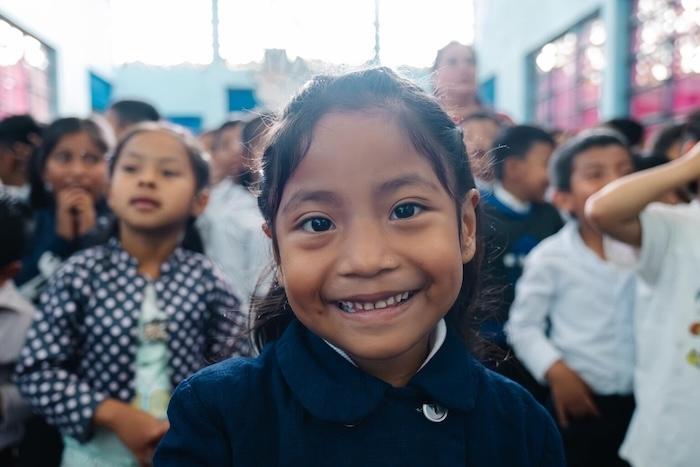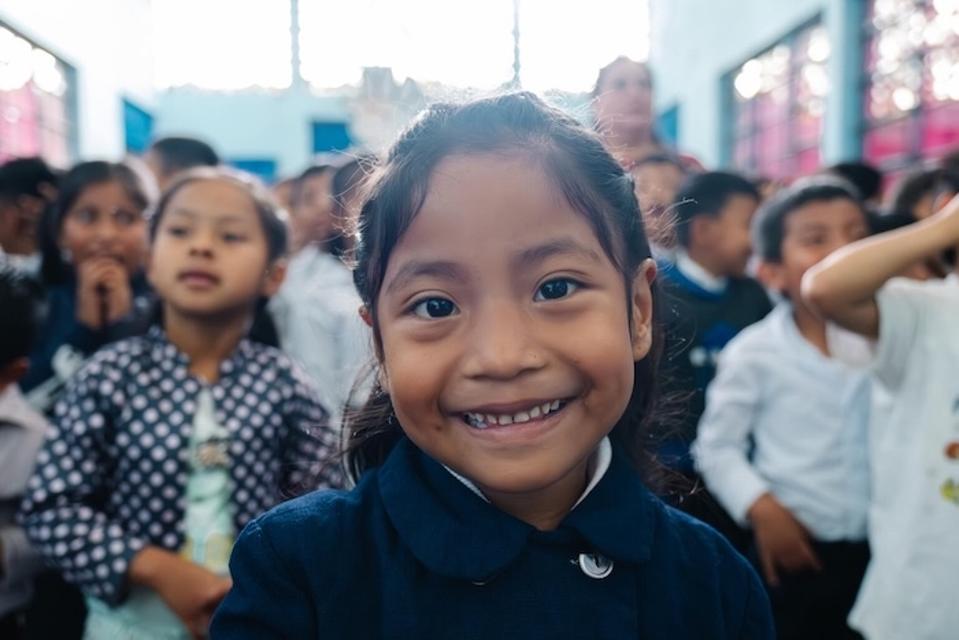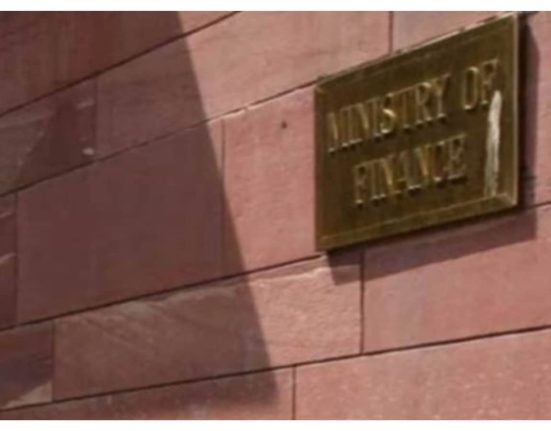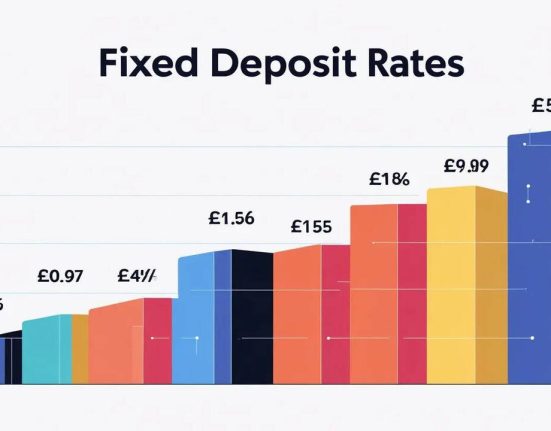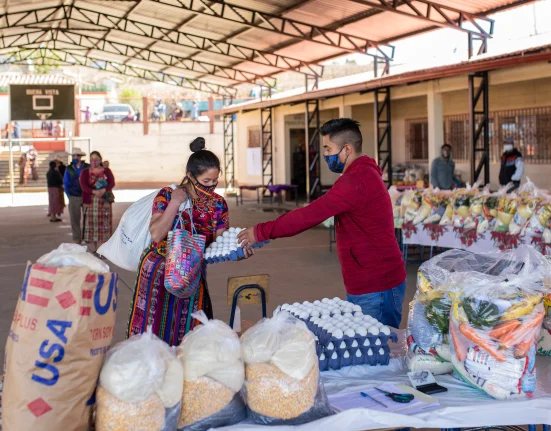At a time of unprecedented cuts to international aid, flexible funding — donations given without restrictions — is needed more than ever to enable UNICEF to carry out its mission. A look at how UNICEF leverages flexible resources to drive impact for children.
Children at the Quebrada Nacimiento Carojá Rural Mixed School in Guatemala take part in the “Clean Hands Festival” — part of a health and hygiene education campaign that UNICEF supports using unrestricted funds.
© UNICEF/UNI783969/Lopez
UNICEF relies on unrestricted, flexible funding to deliver results for children
Emergencies can be very inspiring. Crises that make headline news often generate a flurry of donations to help UNICEF respond to an unfolding situation and deal with its aftermath. An earthquake. A storm surge. A sudden escalation in conflict.
But it’s flexible funding — contributions to UNICEF that are not earmarked for any one country or project — that fuels and sustains UNICEF’s core programs and enables UNICEF to deliver results for children in need across all 190 countries and territories where UNICEF works.
Unrestricted giving is what affords UNICEF the freedom to allocate funds where and when they are needed most, and where they can have the greatest impact. It’s the lifeblood of UNICEF’s operations.
In early 2025, the world faced one of the most severe declines in international aid in recent history, just as global needs were rising to unprecedented levels — making flexible funding more important than ever.
Related: Cutting UNICEF Undercuts American Interests
How unrestricted funds are allocated
Each year, UNICEF allocates unrestricted funds — funding it calls core resources, or regular resources — to offices in low- and middle-income countries using a transparent, data-driven formula guided by equity, urgency and opportunity. The formula looks at three key factors:
- under-5 mortality rate — an indicator of the situation for children in the region
- child population — reflecting the scale of need
- gross national income per capita — indicating the capacity of the government to finance essential services
Every low- and middle-income country where UNICEF works receives a minimum allocation of $850,000, with additional amounts based on this formula. In 2024 alone, unrestricted funds reached 2.1 billion children in 149 countries and territories.
Why unrestricted giving makes a difference
With unrestricted funds, UNICEF — mandated to advocate for the protection of children’s rights, help meet children’s basic needs and expand their opportunities to reach their full potential — can address the root causes of issues, rather than just administering quick fixes. By creating, implementing and investing in stronger systems, unrestricted giving helps build lasting solutions that children can depend on for generations to come.
Unrestricted funds are also invaluable in times of crisis, providing fuel for UNICEF to achieve immediate, tangible impact as well. The Emergency Program Fund, powered by unrestricted giving, allows UNICEF to respond with lifesaving support in the first 24 to 48 hours.
“You can’t put out a fire if you don’t have a fire engine,” Jono Goldstein, a UNICEF International Council Member, explained during a recent UNICEF-led virtual briefing for supporters. “Somebody had to buy that fire engine in advance. Having UNICEF in all these countries to be prepared for when disasters occur — whether they’re natural disasters or human-made disasters — you have to have made that advanced investment.”
The flexibility of unrestricted funds also helps ensure a more equitable allocation of resources, allowing UNICEF to steer support to areas suffering from chronic displacement, ongoing conflict and recurring climate-related disasters such as drought — the so-called forgotten emergencies that are so often underfunded.
UNICEF’s key achievements using unrestricted funds
UNICEF leverages unrestricted funds to make strides towards achieving 12 of the 17 Sustainable Development Goals, from ending poverty and improving health to advancing education, promoting gender equality and enhancing climate resilience —with optimal flexibility.
Unrestricted giving has helped drive some of the greatest achievements in humanitarian and development work in recent history, including:
- cutting the global child mortality rate in half in just 25 years
- registering the births of half a billion children over the last five years, unlocking their access to critical services
- ensuring access to safe water and sanitation for over 2 billion people — more than a quarter of the world’s population — in the last 25 years
- vaccinating half the world’s children each year
- cutting the number of out-of-school children globally in half since 2000
- stopping the early marriages of 25 million girls in the last decade
Here are a few examples of how UNICEF has leveraged flexible funding from donors to drive long-term, sustainable impact for children. For a deeper dive, see UNICEF’s Core Resources 2024 Annual Report and Impact Compendium.
Fighting poverty in Guatemala
Many of the 18 million people who call Guatemala home live in poverty — including 60 percent of children and adolescents. In 2020, when COVID-19 hit, the country’s socio-economic crisis deepened, leaving families more vulnerable.
Backed by hundreds of millions of dollars in unrestricted giving from government and resource partners, UNICEF was able to step in and change the landscape. In just three months, a UNICEF-supported, fully digital social protection program was rolled out, reaching 2.6 million families, including over 4 million children, with critical cash transfers.
Then in 2021, UNICEF partnered with the Guatemalan government to build a household social registry from the ground up. “Building this registry was like conducting an orchestra,” said Alejandra Contreras, a social protection specialist with UNICEF Guatemala. “We brought together government, communities, municipalities and technology to create harmony, ensuring no child is left behind.”
Building on the success of these programs, UNICEF continues to work with partners in Guatemala to ensure every dollar reaches those who need it the most, delivering nutrition, education, agriculture support, social protection and health services. As of March 2025, the social household registry has identified and registered 200,000 households and more than 800,000 people.
Combatting mpox in the Democratic Republic of the Congo
In June 2024, a new, more transmissible and more severe strain of mpox began to devastate communities in the Democratic Republic of the Congo (DRC). Sixty percent of new cases were children.
UNICEF was able to deploy unrestricted funding through the Emergency Program Fund to support health workers battling the outbreak — expanding the capacity of health centers and strengthening the quality of care provided to patients.
Those resources also enabled UNICEF to provide clean water and sanitation, provide psychosocial support services and tackle malnutrition.
Brothers Alema, 13, and Jacques, 15, are both being treated for mpox at a UNICEF-supported treatment center at the University Clinics of Bukavu, South-Kivu province, in the Democratic Republic of Congo.
© UNICEF/UNI776434/Christian Mirindi Johnson. All rights reserved.
Reinventing Yemen’s health system
After nearly a decade of conflict in Yemen, essential services are fractured and strained. Leveraging the flexibility of unrestricted funds, UNICEF has been working to reimagine and restructure Yemen’s health system by tapping into the strength and reach of community health workers.
With the Government of Yemen and partners, UNICEF supports 3,600 community health workers in 90 districts by providing training and medical supplies.
“Before the project’s interventions, children and pregnant and lactating women did not receive medical care,” said Sumaya, a UNICEF-supported health worker in Lahj. “But thanks to UNICEF, cases are identified and referred at the right time. The community health worker network is a lifesaving network for children and mothers.”
Strengthening the health system has helped reduce Yemen’s child mortality rate by 23 percent in the last decade. In 2024 alone, community health workers reached almost 2 million women and children in the country.
Latifa Saleh, a community mobilizer and vaccinator in Aden, Yemen, administers a vaccine to a newborn, just a week old. UNICEF plays an important role in ensuring the availability of supplies and equipment at this health center and many others across the country, protecting the health and well-being of countless mothers and children.
© UNICEF/UNI787584/Mahmoud ALfilastini. All rights reserved.
Ensuring safety and sanitation in India
Back in 2013, more than half a billion people in India had no access to a toilet, and the subject of sanitation was taboo. But then UNICEF launched a provocative campaign designed to change the conversation: Take Poo to the Loo.
This was just the first step. A year later, UNICEF teamed up with the Indian Government to launch the Swachh Bharat Mission, focused on handwashing and building millions of sanitary facilities.
“Women and girls used to go out into the open late at night or very early morning, exposing them to many risks,” said Alka Gupta, a communication specialist with UNICEF India. “The mission brought about a focus on women, and empowering women … around women’s safety and dignity, which was something absolutely new.”
In just five years, UNICEF and partners built 100 million toilets using flexible funding, and India became an open defecation-free country.
In that same time, the under-5 mortality rate in India decreased by 30 percent.
In 2019, a mother and her 10-month-old play in the shade of their home in India, where a toilet was built just a few years prior with the help of UNICEF and funds from unrestricted giving.
© UNICEF/UNI289472/Ashima Narai
Learn more about where UNICEF works to ensure children are healthy, educated, respected and protected.
Your unrestricted contribution to UNICEF is more important than ever. Help now.
Right now, the lives of the most vulnerable children hang in the balance as conflicts and crises jeopardize the care and protection that they deserve. Dependable, uninterrupted and effective foreign aid is critical to the well-being of millions of children. Please contact your members of Congress and urge them to support ongoing U.S. investments in foreign assistance.

